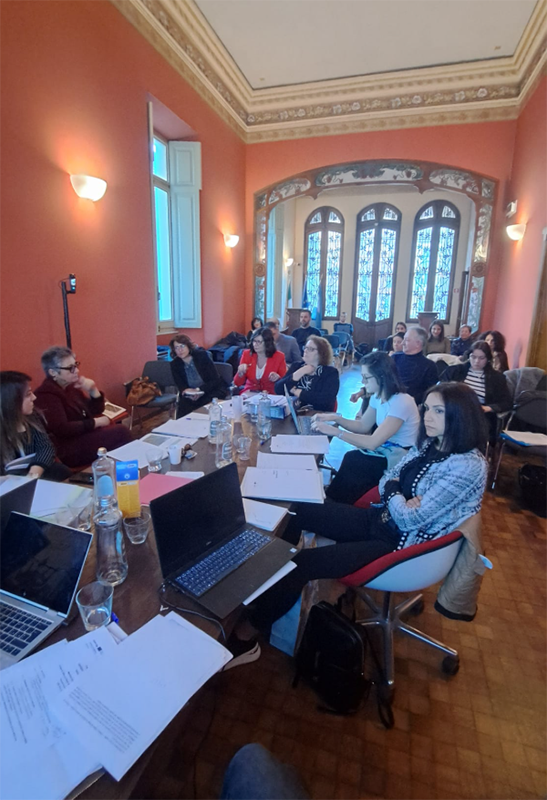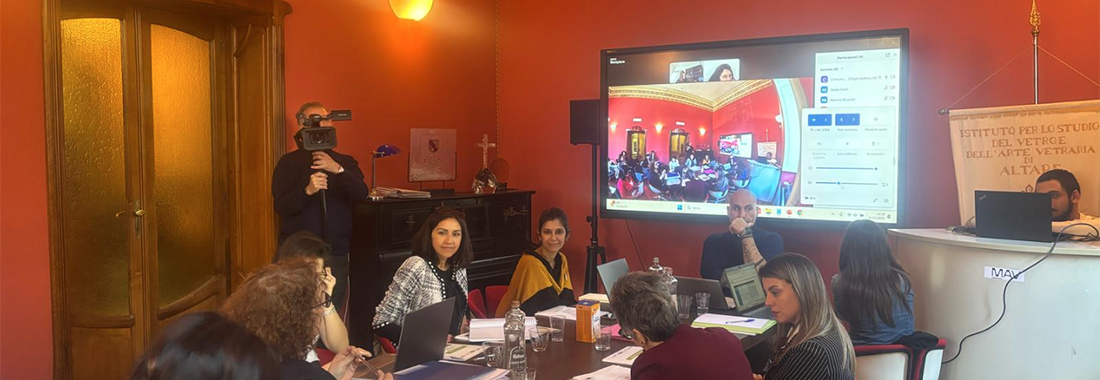The third Steering Committee of the RICREA project – Collaborative Network for the Capitalization of REtrAlags – was held in Altare (Savona). The project is funded by the Italy–France Maritime Interreg Programme.
The REtrAlags project developed a shared model for the sustainable and coordinated management of lagoons, lakes, and ponds in cross-border areas between Italy and France, with the aim of improving the effectiveness of public actions to protect and enhance ecosystem heritage. Building on this experience, RICREA aims to strengthen the resilience of cross-border river, lake, and wetland areas, which are increasingly exposed to the effects of climate change, by transferring the results of the contracts developed under REtrAlags to other natural sites. A key feature of RICREA is the introduction of Ecological Transition Contracts (ETCs)—innovative planning tools that promote cooperation among diverse local stakeholders in the management of natural resources.
The meeting, held on March 26 at the Museum of Glass Art in Altare, marked a pivotal moment to assess the progress of the RICREA project one year after its launch. Project partners, public administrators, and stakeholders gathered in a spirit of full collaboration to share results, address emerging challenges, and define next steps. Central themes included sustainable land management, networking of best practices, and the design of pilot actions aimed at creating replicable models.
Throughout the day, the focus was placed on capacity building activities, including a review of the progress of the cross-border twinning initiative, the definition of methods for updating existing contracts, and the launch of sustainability plans for the interventions. In parallel, the first pilot actions—both material and non-material—were launched. The discussion also included a proposal for administrative and financial adjustments, followed by a detailed analysis of the project's financial progress and the definition of reporting procedures. The day concluded with the approval of the communication plan and the organization of cross-cutting and operational activities.

WHAT IS AN ECOLOGICAL TRANSITION CONTRACT?
An Ecological Transition Contract (CTE) is a planning and governance tool designed to promote the sustainable and integrated management of natural resources—such as coastal areas, wetlands, lagoons, and river systems—by engaging local communities, public authorities, and stakeholders in a shared and participatory process.
These contracts aim to support the ecological transition of territories through the identification of concrete actions, shared objectives, and long-term commitments to restore, protect, and enhance ecosystems, while also strengthening resilience to climate change and fostering sustainable development.
Latest news

REST-COAST: Strategies for the Protection of European Coasts Outlined in Catania
From March 24 to 27, 2025, the annual meeting of the European project REST-COAST, funded by the Horizon 2020 program, was held in Catania. The meeting marked a key milestone toward the…

A Forest for Bees Takes Root in Sardinia: Restoring Nature, Supporting Pollinators
The planting operations for the first Forest for Bees installation—a forest for bees—have been completed in Sennariolo (OR). This is a special one-hectare forest dedicated to bees and pollinators, essential insects for food…

Altare Hosts RICREA Meeting: Shared Strategies Through Ecological Transition Contracts
The third Steering Committee of the RICREA project – Collaborative Network for the Capitalization of REtrAlags – was held in Altare (Savona). The project is funded by the Italy–France Maritime Interreg Programme.

GRRinPORT2: Innovation and Cross-Border Cooperation for Environmental Protection of Ports
On March 20–21, 2025, the Kickoff Meeting of the GRRinPORT2 project – Management of water, waste, and sediments to reduce pollution in ports – was held at the DESTEC Department of the University of Pisa…

MEDSEA Launches the Wetland4Change Project in Terralba to test and validate climate change's solutions
On Friday, March 14, 2025, in the council chamber of Terralba, MEDSEA held a meeting with the Municipality of Terralba to officially introduce Wetland4Change to stakeholders (productive activities, as well as institutional…

In Crete with ARTEMIS to protect seagrass meadows: 2nd Consortium Meeting
From March 4th to 6th, 2025, Heraklion (Crete) hosted the mid-term meeting of the ARTEMIS Interreg Euro-MED Natural Heritage project, organized by the Hellenic Marine Research Centre. This was a crucial moment to…

MEDSEA Heads to Tallinn for the Blue4All Consortium Meeting
Last January, the Blue4All project team gathered in Tallinn for the Consortium Meeting, marking the project's halfway point. The event, hosted by the local partner Keskkonnaamet/Estonian Environmental Board and the University of Tartu, brought together all 22 project partners from across…

ImPelaghiamoci: A Year of Initiatives to Learn About and Protect Cetaceans with the Municipality of Sassari
Promoting greater knowledge of the resident cetaceans in the Pelagos Sanctuary*, a transboundary marine protected area encompassing France, Liguria, Tuscany, and Sardinia, to improve the protection and conservation of these species…

Reforestation Operations Resume in Montiferru: A Forest for Bees by MEDSEA
Reforestation efforts in Montiferru, led by MEDSEA, are back on track. Following the planting of the first 5 hectares of olive trees, holm oaks, and Mediterranean shrubs, the focus now shifts to melliferous plants to…

25 Events in Sardinia for World Wetlands Day
Wetlands such as ponds, lagoons, lakes, rivers, and peatlands form an endless world of aquatic ecosystems. In Sardinia, the call to explore these habitats is open this February with the Sardinian edition of World Wetlands Day.

COASTRUST: Launching Sustainable Coastal Management in Domus de Maria Sardinia
The activities of the COASTRUST project, funded by the European Interreg Euro-MED program, have officially begun in Sardinia. The initiative aims to promote shared environmental management in the Mediterranean's coastal areas, addressing anthropogenic pressures…

Join the World Wetlands Day Sardinia 2025 Calendar: register your Event by January, 22nd
World Wetlands Day is celebrated every year on February 2, marking the adoption of the Convention on Wetlands signed on February 2, 1971, in Ramsar, on the shores of the…

MEDSEA joins the Camargue Red Alert with the Mediterranean Alliance for Wetlands to save birdlife
The MEDSEA Foundation has officially joined 73 other international organizations in signing the Camargue Red Alert, a collective call to action to safeguard the Camargue wetlands in France.

Wetland4Change: MEDSEA in Valencia to Explore Natural Climate Solutions Through Wetlands
The MEDSEA team participated in the second Consortium meeting of the Wetland4Change project in Valencia from November 26 to 28, 2024. The meeting was organized by local project partners, the…

Malta’s First Posidonia Meadow Restoration Project Led by MEDSEA Foundation
Different islands, but similar issues for marine ecosystems, which are heavily threatened by unregulated anchoring from recreational boating and illegal trawling. In Malta, as in Sardinia, the damage is particularly…

We are all at 'Valencia'-like risk, and here’s why
Le recenti inondazioni a Valencia sono un esempio tangibile di come gli eventi estremi legati al cambiamento climatico stiano aumentando in frequenza, intensità e durata, colpendo duramente il Mediterraneo, un vero e proprio…
- 1
- 2
- 3
- 4

